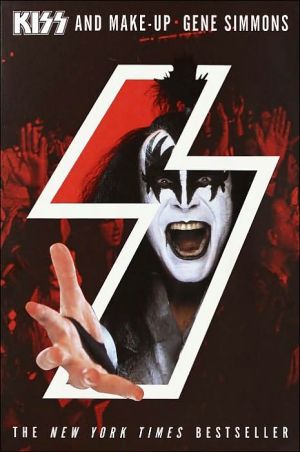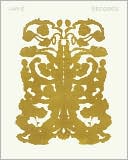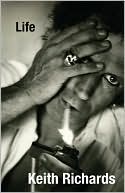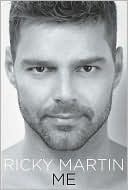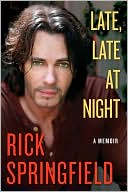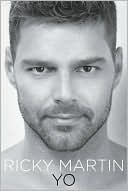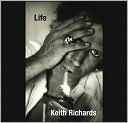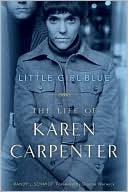Kiss and Make-Up
You wanted the truth, you got the truth-the hottest book in the world! \ Fueled by an explosive mix of makeup, costumes, and attitude, KISS burst onto the music scene thirty years ago and has become a rock institution. The band has sold more than eighty million records, has broken every concert attendance record set by Elvis Presley and the Beatles, stands behind the Beatles alone in number of gold records from any group in history, and has spawned more than 2,500 licenses.\ There would have...
Search in google:
You wanted the truth, you got the truth-the hottest book in the world!Fueled by an explosive mix of makeup, costumes, and attitude, KISS burst onto the music scene thirty years ago and has become a rock institution. Publishers Weekly The "Phantom of the Park," aka Simmons, needs nary a ghostwriter to pen his bio, for he ably delivers this season's most fascinating backstage pass. Articulately detailing his life from his birth in Israel through the 30-year life span of Kiss, he charts how glam-metal's greatest pioneers provided the most outrageous spectacles of arena rock in the 1970s. Those same pyrotechnics, pneumatic drum risers, jacked-up personas and frightening face paints have sold 80 million records worldwide. Simmons, the "guy who sticks his tongue out and spits fire," boasts other onstage innovations, including "throwing up blood" and creating the ubiquitous headbanger's hand sign for the devil. All in all, the rock 'n' roll extravaganzas of the Kiss empire hardly run short of the obvious wild parties, famous faces, hotel fiascoes, banging up cars and getting busy with groupies. Though no Wilt Chamberlain, Simmons describes at length how he has slept with 4,600 women. But when the smoke clears, the book is as well written as it is interesting: the story of a Jewish kid from Brooklyn, the endearingly sincere struggles Simmons faces over the years, his eventual marriage and fatherhood as well as juicy material like his extended romances with Cher and Diana Ross. While moldering rock stars who have tales to tell may be a dime a dozen, Simmons's enjoyable and intriguing autobiography deserves attention. 50 b&w photos. (Jan.) Forecast: Thanks to Kiss comic books, dolls and other paraphernalia, the band's quasicult fan base runs the gamut of age and cultural orientation. Expect big sales garnered from mass e-mails, author interviews and a 50-city radio tour. Copyright 2001 Cahners Business Information.
Someday soon, just after the final chords of "Rock and Roll All Nite" ring out on the Shea Stadium stage, I will pick up my bass and exit stage right. After twenty-nine glorious and tumultuous years, years filled with the highest highs and the lowest lows, America will have seen the last of KISS onstage. America was our home. These were our people. And playing the final show will be bittersweet, to say the least. \ Thirty years before, there was no KISS. There was only Gene Simmons, an aspiring rock musician in New York City. Ten years before that, there was no Gene Simmons -- only Gene Klein, a Jewish kid who lived in Queens with his single mother. And ten years before that, there wasn't even a Gene Klein -- only Chaim Witz, a poor boy growing up in Haifa, Israel. All those people, of course, were me, and I was all those people. I was born in Israel, saw the world change around me when I came to America with my mother, and then began to change myself, first my name, then my face. When I picked up a bass, it was a kind of transformation. When I put on face paint, it was a kind of transformation. And when I took the stage, it was the most profound transformation of them all. In the process, I managed to help steer KISS to the pinnacle of rock and roll: we would eventually stand right behind the Beatles in the number of gold record awards by any group in history.\ In my life story, I am the main character. But countless supporting characters have helped to define my life. First, there's the woman who gave me life, my mother, who endured unspeakable horrors in the concentration camps of the Nazis and who used reserves of strength I can only imagine to survive and even thrive. Then there are my bandmates, my second family -- Paul Stanley is like the brother I never had, and Ace Frehley, Peter Criss, Eric Carr, Eric Singer, Bruce Kulick, and others helped me to create and sustain KISS (and in some cases, did their best to undo what Paul and I had created and sustained). And last but not least -- last and probably most -- there is lovely, incomparable Shannon Tweed, and the two children of whom we are the proudest parents imaginable, Nicholas and Sophie.\ When I sat down to write my life story, I thought about it in terms of the books I had read. The more I thought about it, the more I realized that my story is a story about power and the pursuit of it. I have always read everything I could get my hands on, especially books that taught me new things: religion, philosophy, history, the social sciences, and so forth. There are thousands of books, from African Genesis to World Lit by Fire, that recount man's endless search for power. Ultimately, all conflict seems to center on it, on who has it and who wants it. I instinctively realized very early on that power was what I really wanted. Fame and riches are fine, but one can have both and still have no power. Power is something I craved from the time I first set foot in America. I was made fun of because I couldn't speak English, or because I was Jewish, but it really came down to not having power.\ Someone, perhaps Machiavelli, once said that it's better to be feared than loved. I understand that. Love is evasive. Love has its needs. You have to be giving. You have to be concerned with someone else's happiness. Power is a clearer idea, a cleaner concept. I want to walk into a restaurant and be waited on. I want to have women want me, although not necessarily because I want them. Women understand this notion very well. A woman wants to make herself as attractive as she can, with makeup, clothing, and perfume, because she wants every man to want her, although she may not be interested in any of them. I realize that I'm painting with broad strokes here, but I stand by what I'm saying.\ I suppose one of the reasons I wanted power was so I wouldn't get picked on. When I first came to America, I felt like a stranger in a strange land. The Robert Heinlein book spoke to me as no other book ever had. It was my story. I was singled out because I was different, because I didn't speak English well, because I was alone. So I figured that I didn't need anyone, didn't want anyone, and had only myself to depend on. If I didn't do the work and go and get it myself, it would certainly never be handed to me.\ The story of KISS, of Gene Simmons, is a story of ambition and good fortune, of an immigrant boy's impossible dream realized. But it's also a story of the world's biggest rock band, which means that there's plenty of sex, drugs, and rock and roll. I can't take credit for any of the drugs -- I'm straight, never been drunk, not a single time in my life. But the sex? For much of my adult life, I had no girlfriends, although I had plenty of girls. More than plenty. At some point, I began to keep Polaroid snapshots of my liaisons to remember them by. In a certain way, I loved every one of them. But when it was over, it was over. No fuss, no muss. No agony. To date, I have had about 4,600 liaisons. And I have to say that they were all wonderful, that they all enhanced my life in so many ways. Food tasted better. I whistled and hummed. I was alive.\ Somehow, through all the craziness with women, despite the sheer numbers, I managed to become a dedicated father. If this seems strange to you, think of how it seems to me. My father left my mother and me when I was still young, and I grew up convinced that I would never have children, in part because I remembered the pain of abandonment, in part because I lived in terror of repeating my father's mistakes. Then I met a girl named Shannon Tweed. The next thing I knew, I was holding my son in the hospital, unwilling to give him up to the doctors. How do I reconcile the cocksman with the family man? The same way I reconcile the shy immigrant boy with the leather-and-studs Demon who climbed onstage to breathe fire. Every personality has contradictions, and a large personality has large contradictions.\ I have lived my life for myself. I'm not afraid to admit that. But I have also lived my life for the fans: for the faithful soldiers in the KISS Army, those who stood by us through thick and thin, through changing fashion, those who braved bad traffic and bad weather to come out and let us entertain them. When I first sat down to write this book, I was torn by whether I should tell the truth about their band: about the internal rifts and feuds, the personality conflicts and personality disorders. I was torn because I feared that the truth might ruin people's perception of their heroes. And whatever else KISS was, it was about heroes, about magic, about believing in it and delivering the goods. You, the fans, have always deserved the best from us. It's one of the reasons we introduced ourselves at every show with "You wanted the best, you got the best. The hottest band in the world, KISS." In sickness and in health, whether we felt like it or not, we believed we had an obligation to get out there, play our hearts out, and give you everything we had.\ I believe that when children grow up, they should find out the truth about their parents. Those of you who believe in KISS need to know the truth. I know that a lot of the things you'll read in this book will be hard to take. I know that some fans may get upset at me. I know that some members of the band will hate me more than ever and claim that everything between these covers is a lie, despite my memory, despite the documentation, despite the witnesses who will attest to the events.\ Either way, here's the truth, the whole truth, and nothing but the truth, so help me God.
\ From Barnes & NobleTake a look beyond the makeup and the glam costumes with Gene Simmons' autobiography. KISS fans all over the world know that Simmons is a ladies' man with a wild reputation -- but how many know that his real name is Chaim Witz? That he spent his childhood in Israel and later attended rabbinical school in Brooklyn? In KISS and Make-Up, Simmons describes the rise, decline, and rebirth of KISS and tells all about his love affairs and his occasionally rocky friendships with KISS bandmates.\ \ \ \ \ Publishers WeeklyThe "Phantom of the Park," aka Simmons, needs nary a ghostwriter to pen his bio, for he ably delivers this season's most fascinating backstage pass. Articulately detailing his life from his birth in Israel through the 30-year life span of Kiss, he charts how glam-metal's greatest pioneers provided the most outrageous spectacles of arena rock in the 1970s. Those same pyrotechnics, pneumatic drum risers, jacked-up personas and frightening face paints have sold 80 million records worldwide. Simmons, the "guy who sticks his tongue out and spits fire," boasts other onstage innovations, including "throwing up blood" and creating the ubiquitous headbanger's hand sign for the devil. All in all, the rock 'n' roll extravaganzas of the Kiss empire hardly run short of the obvious wild parties, famous faces, hotel fiascoes, banging up cars and getting busy with groupies. Though no Wilt Chamberlain, Simmons describes at length how he has slept with 4,600 women. But when the smoke clears, the book is as well written as it is interesting: the story of a Jewish kid from Brooklyn, the endearingly sincere struggles Simmons faces over the years, his eventual marriage and fatherhood as well as juicy material like his extended romances with Cher and Diana Ross. While moldering rock stars who have tales to tell may be a dime a dozen, Simmons's enjoyable and intriguing autobiography deserves attention. 50 b&w photos. (Jan.) Forecast: Thanks to Kiss comic books, dolls and other paraphernalia, the band's quasicult fan base runs the gamut of age and cultural orientation. Expect big sales garnered from mass e-mails, author interviews and a 50-city radio tour. Copyright 2001 Cahners Business Information.\ \ \ Library JournalSay what you will about KISS leader Simmons, he's a straight shooter. Born and raised in relative poverty in Israel, the former Chaim Witz came to New York City as a young boy with his single mother and was immediately drawn to TV and comic books to assuage culture shock and loneliness. These provided the rudiments behind the band KISS-fantastic, devil-heroes in outrageous costumes. The author is barbarically clear about his motivation for being a rock star-like many before and after him, music was a vehicle to get girls. A proponent of quantity over quality, Simmons claims to have had 4600 liaisons (with Polaroids to prove it). He threw any energy leftover from bedroom pursuits into KISS; live shows, merchandising, movies, comic books, and even some decent rock music earned a rabid fan base. Fairly gossipy, this self-congratulatory narrative details a few of the ins and outs of the band (Ace Frehley was lazy, Peter Criss insecure) and Simmons's own past (glimpses of life with Cher). Though slow at times, Simmons's delivery is calm and measured. Fine for large audio collections.-Douglas C. Lord, formerly with Connecticut State Lib., Hartford Copyright 2003 Reed Business Information.\ \ \ \ \ Kirkus ReviewsRaunchy, good-hearted memoirs of the prodigiously tongued co-founder of megaselling band KISS. Simmons (previously Gene Klein, previously Chaim Witz) defends his warts-and-all narrative of pop-culture collisions and 1970s excess by noting, "Those of you who believe in KISS need to know the truth." The most colorful, engaging sections here deal with Simmons's childhood in Israel and Queens. He attended yeshiva to please his fiercely devoted mother, yet became obsessed with "television, the Beatles, superheroes, science fiction, girls. Everything about America." As for the band's roots: "We all picked up guitars because we all wanted to get laid," Simmons writes. With his ambitious songwriting partner Paul Stanley, and the rougher-edged Peter Criss and Ace Frehley, Simmons lived and rehearsed in dingy lofts while writing flamboyantly muscular songs like "Strutter" and "Firehouse" and devising schemes to attract industry attention. Their tactics worked well, and their dynamic stage show (incorporating pulp-Kabuki makeup, tight leather, pyrotechnics, fire-breathing, and blood-spitting) rapidly built their reputation. KISS sold out stadiums throughout the '70s, but by 1982 internal strife and commercial missteps made the band appear shopworn. KISS soldiered on without Criss, Frehley, or makeup throughout the heavy-metal 1980s. The events become less compelling here, as Simmons surveys his merchandising savvy and his then-insatiable drive for short-term romance: Like many aging rockers, he recalls his odyssey with hazy bonhomie and good-humored bluster that can turn nasty, e.g., his gratuitous slams of '70s art rock bands and '90s grunge and his acrimonious portrayal of Criss andFrehley as self-destructive chuckleheads who needed to leave the band for everyone's benefit. They were eventually hired back as contract players, in time for a final tour in makeup and appearances at lucrative, popular fan conventions. "The KISS Army" will appreciate Simmons's fondness for them and uncritically consume his heavy-metal memories.\ \
